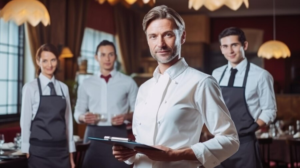Advanced Food and Beverage Service- A BHMCT (Bachelor of Hotel Management and Catering Technology) program with a specialization in Advanced Food and Beverage Service is an academic program that focuses on providing students with a comprehensive understanding of the advanced aspects of food and beverage service within the hospitality industry. This program is typically offered by hospitality management institutes and colleges. Here are some key features and components you can expect in such a program:
- Core Hospitality Courses: BHMCT programs usually start with core hospitality courses that provide a foundation in the hospitality industry. This may include subjects like hospitality management, hotel operations, and food production.
- Advanced Food and Beverage Service: The specialization in Advanced Food and Beverage Service will delve into topics specifically related to this aspect of the industry. This can include courses on wine and beverage management, culinary arts, menu planning, and restaurant management.
- Practical Training: Hands-on training is a significant part of BHMCT programs. Students often participate in internships, work in real-world hotel and restaurant settings, and gain practical experience in food and beverage service operations.
- Customer Service and Communication Skills: Since advanced service often involves direct customer interaction, students will learn effective communication and customer service skills. This includes understanding guest preferences, handling complaints, and creating a positive dining experience.
- Wine and Beverage Knowledge: Students will gain in-depth knowledge of wines, spirits, cocktails, and non-alcoholic beverages. They may learn about wine tasting, pairings, and the management of a bar.
- Menu Design and Planning: Courses in menu design and planning cover the creation of diverse and appealing menus, understanding food costing, and adapting menus to different culinary styles and customer preferences.
- Tableside Service: Students may be trained in tableside service techniques, which involve preparing or finishing dishes at the customer’s table, adding an element of showmanship to the dining experience.
- Restaurant Management: Courses in restaurant management cover topics like restaurant marketing, staffing, inventory management, and financial aspects of running a food and beverage establishment.
- Industry Trends: Keeping up with current industry trends is crucial, so students may study topics like sustainable practices, international cuisine, and the use of technology in hospitality.
- Culinary Skills: While not as extensive as culinary arts programs, students in Advanced Food and Beverage Service may still receive some training in basic culinary skills to understand food preparation and presentation.
- Event and Banquet Management: Some programs may also include coursework related to managing banquets and special events, which often require advanced food and beverage service skills.
Upon completion of the program, graduates can pursue careers in various segments of the hospitality industry, such as working in fine dining restaurants, luxury hotels, catering companies, and cruise ships. They can take on roles like restaurant managers, sommeliers, beverage managers, food and beverage supervisors, and catering managers, among others.
What is Advanced Food and Beverage Service
Advanced Food and Beverage Service refers to a high level of service and expertise provided in the hospitality and foodservice industry. It goes beyond basic food and beverage service and often involves a more sophisticated and specialized approach to catering to the needs and preferences of customers. Here are some key aspects of advanced food and beverage service:
- Culinary Expertise: Advanced service often requires a deep understanding of culinary techniques, ingredients, and menu knowledge. Servers and staff should be well-versed in the preparation methods and ingredients used in the dishes they serve.
- Wine and Beverage Knowledge: Knowledge of wine and other beverages, including cocktails, spirits, and non-alcoholic options, is crucial. Staff should be able to make recommendations, pair drinks with food, and provide information about the origins and characteristics of different beverages.
- Presentation: Advanced service places a strong emphasis on the visual presentation of food and beverages. This includes plate presentation, garnishing, and the use of fine china, glassware, and silverware.
- Tableside Service: In some upscale restaurants, tableside service is a hallmark of advanced food and beverage service. This involves preparing, finishing, or presenting certain dishes or drinks at the customer’s table, adding a level of theatricality and personalization to the dining experience.
- Customer Interaction: Staff in advanced food and beverage service establishments are often expected to have excellent interpersonal skills. They should be able to engage with customers, answer questions about the menu, provide recommendations, and cater to specific dietary preferences or restrictions.
- Sommeliers and Mixologists: High-end restaurants often employ sommeliers (wine experts) and mixologists (cocktail experts) to enhance the dining experience. These professionals can provide in-depth information about wine and cocktails and help customers make choices that complement their meals.
- Menu Customization: Advanced service establishments may offer customized or personalized menus for special occasions or VIP guests. This requires a flexible and knowledgeable staff that can adapt to unique customer requests.
- Timing and Coordination: Timing is critical in advanced service to ensure that dishes are served at the right temperature and that courses are properly spaced. Coordination among the kitchen, bar, and service staff is essential to provide a seamless dining experience.
- Attention to Detail: Advanced food and beverage service places a strong emphasis on attention to detail, from the cleanliness of the dining area to the precision of food plating and the accuracy of orders.
- Quality and Presentation of Service Ware: The use of high-quality service ware, such as fine china, crystal glassware, and polished silverware, contributes to the overall aesthetic and experience of the meal.
Overall, advanced food and beverage service aims to create a memorable and luxurious dining experience for customers, often in upscale restaurants, hotels, and catering events. It requires a high level of training, expertise, and professionalism among the staff to meet and exceed customer expectations.
When is Advanced Food and Beverage Service

The availability and scheduling of a Bachelor of Hotel Management and Catering Technology (BHMCT) program with a specialization in Advanced Food and Beverage Service can vary depending on the specific institution offering the program. Typically, BHMCT programs are full-time undergraduate programs with a duration of three to four years.
To find out when a BHMCT program with a specialization in Advanced Food and Beverage Service is offered, you should consider the following steps:
- Research Institutions: Start by researching hospitality management institutes and colleges that offer BHMCT programs. You can do this by visiting their official websites, contacting their admissions offices, or using educational directories and websites.
- Check Program Offerings: Once you identify potential institutions, explore their program offerings. Look for BHMCT programs that offer a specialization in Advanced Food and Beverage Service. Program details, including start dates, duration, and curriculum, should be available on the institution’s website or in their program brochure.
- Contact Admissions: Reach out to the admissions or academic departments of the institutions you are interested in. They can provide you with detailed information about program start dates, admission requirements, application deadlines, and any specific admission tests or procedures you need to follow.
- Attend Information Sessions: Many educational institutions hold information sessions or open houses where you can learn more about their programs. Attending these events can be a great way to gather information and clarify any doubts you may have about the program.
- Apply for Admission: Once you have all the necessary information and meet the admission requirements, you can proceed to apply for admission to the BHMCT program with the specialization in Advanced Food and Beverage Service. Be sure to adhere to the application deadlines set by the institution.
Please keep in mind that the availability of this specialization may vary from one institution to another, and program start dates may align with the regular academic calendar (e.g., starting in the fall or spring semester) or follow a unique schedule established by the institution. Therefore, it’s essential to directly contact the institutions you are interested in for the most accurate and up-to-date information regarding program start dates and availability.
Application of Advanced Food and Beverage Service
After completing a Bachelor of Hotel Management and Catering Technology (BHMCT) program with a specialization in Advanced Food and Beverage Service, graduates have various career opportunities in the hospitality and foodservice industry. Here are some common applications and career paths for individuals with this specialization:
- Restaurant Manager: Graduates can work as restaurant managers in upscale or fine dining restaurants. They are responsible for overseeing the daily operations of the restaurant, managing staff, ensuring high-quality service, and optimizing the dining experience for guests.
- Beverage Manager or Sommelier: Those with expertise in wine and beverage management can pursue careers as beverage managers or sommeliers. They curate wine lists, create beverage programs, and provide recommendations to customers, enhancing the overall dining experience.
- Food and Beverage Director: In larger hospitality establishments, such as hotels and resorts, graduates may become food and beverage directors. They oversee multiple food and beverage outlets, manage budgets, plan menus, and ensure the quality of service.
- Catering Manager: Catering managers are responsible for organizing and managing catering events, whether they are in hotels, catering companies, or other event venues. They coordinate menu planning, staffing, and logistics for weddings, corporate events, and other special occasions.
- Event Planner: Graduates can pursue careers as event planners, specializing in food and beverage aspects of event coordination. They work with clients to plan and execute events, considering menu choices, catering logistics, and beverage service.
- Bar Manager or Mixologist: Those with a passion for mixology and bartending can become bar managers or mixologists in bars, lounges, and nightclubs. They create signature cocktails, manage bar operations, and ensure responsible beverage service.
- Food and Beverage Consultant: Experienced professionals may offer their expertise as consultants to help restaurants, hotels, or catering businesses improve their food and beverage operations. They provide insights on menu development, cost control, and service quality.
- Entrepreneurship: Some graduates choose to start their own food and beverage ventures, such as opening restaurants, cafes, bars, or catering businesses. The knowledge gained during their BHMCT program can be valuable for entrepreneurial success.
- Teaching and Training: A career in education is also an option. Graduates can become instructors or trainers in hospitality and culinary schools, sharing their knowledge and expertise with aspiring professionals.
- Hospitality Management: While specializing in Advanced Food and Beverage Service, graduates may also choose to pursue broader careers in hospitality management. They can take on roles such as hotel managers, resort managers, or general managers in the hospitality industry.
- Cruise Ship and Airline Catering: Some graduates may work in the cruise ship or airline industry, overseeing the food and beverage operations on board, ensuring quality service for travelers.
Overall, a BHMCT program with a specialization in Advanced Food and Beverage Service equips graduates with a diverse skill set that can be applied in various segments of the hospitality industry. The specific career path chosen will depend on individual interests, career goals, and the opportunities available in the industry.
Case Study on Advanced Food and Beverage Service
Title: Elevating Dining Experiences at “Gourmet Delights” Restaurant
Background: “Gourmet Delights” is an upscale, fine dining restaurant located in a luxurious hotel in a bustling city. The restaurant has a reputation for its exquisite cuisine and top-notch service, but the management aims to elevate the dining experience even further.
Challenges:
- While the restaurant’s menu is excellent, there is a desire to introduce seasonal tasting menus that change regularly to keep patrons engaged and excited.
- “Gourmet Delights” wants to enhance its wine and beverage offerings to complement the diverse range of dishes on the menu.
- The restaurant seeks to create an exclusive dining experience with personalized service, particularly for VIP guests.
Solution: The hotel’s management decided to hire a graduate of the BHMCT program with a specialization in Advanced Food and Beverage Service, Lisa, to address these challenges.
Implementation:
- Seasonal Tasting Menus: Lisa, with her expertise in menu planning, collaborated with the executive chef to create a rotating seasonal tasting menu. Each menu reflects the freshest ingredients of the season and includes wine pairing recommendations for each course. This addition not only enhanced the dining experience but also encouraged repeat visits as patrons looked forward to new offerings.
- Wine and Beverage Program: Lisa took charge of revamping the wine and beverage program. She curated an extensive wine list featuring both well-known and lesser-known labels, emphasizing wine pairings for various dishes. Additionally, she introduced a specialty cocktail menu showcasing unique, handcrafted cocktails. Training the restaurant staff in beverage service and pairings was a key part of this process.
- VIP Experience: To create an exclusive VIP dining experience, Lisa implemented a VIP membership program. Members receive personalized attention from the moment they make a reservation. Lisa trained the staff to recognize VIP members and to cater to their specific preferences. The restaurant also introduced special VIP tasting menus and access to private dining rooms for a more intimate experience.
Outcomes:
- Increased Revenue: The introduction of seasonal tasting menus and an enhanced beverage program led to increased revenue as diners were more willing to explore new culinary experiences.
- Higher Customer Satisfaction: Customers expressed high levels of satisfaction with the personalized service and the variety of wine and beverage choices.
- Repeat Business: The restaurant saw a significant increase in repeat business, with many patrons becoming VIP members.
- Positive Reputation: “Gourmet Delights” gained a reputation as a top destination for fine dining in the city, attracting food and wine enthusiasts from all over.
In this case study, Lisa, with her specialized knowledge and skills in Advanced Food and Beverage Service, played a pivotal role in transforming “Gourmet Delights” into a thriving and exclusive dining establishment. Her expertise not only improved the restaurant’s bottom line but also enhanced its reputation and customer loyalty.
White paper on Advanced Food and Beverage Service
Title: Enhancing Hospitality Excellence through BHMCT Advanced Food and Beverage Service
Table of Contents:
- Executive Summary
- An overview of the white paper’s key findings and recommendations.
- Introduction
- An introduction to the importance of food and beverage service in the hospitality industry.
- The role of BHMCT programs in shaping professionals for this sector.
- Understanding Advanced Food and Beverage Service
- A detailed explanation of what advanced food and beverage service entails.
- The significance of this specialization in delivering exceptional dining experiences.
- Curriculum and Training in BHMCT Advanced Food and Beverage Service
- An exploration of the curriculum typically covered in BHMCT programs with this specialization.
- Theoretical and practical components of the curriculum.
- The role of internships and hands-on training.
- Career Opportunities and Applications
- Diverse career paths for BHMCT graduates with a specialization in Advanced Food and Beverage Service.
- Case studies highlighting successful applications in various hospitality settings.
- Impact on Hospitality Businesses
- How advanced food and beverage service expertise can positively impact businesses.
- The financial implications, including revenue growth and customer loyalty.
- Trends and Innovations
- Current trends in food and beverage service, including sustainability, technology integration, and changing customer preferences.
- Innovations in menu planning, beverage pairing, and service delivery.
- The Role of Advanced Food and Beverage Service in Customer Experience
- The connection between food and beverage service and overall guest satisfaction.
- How personalized service and menu expertise contribute to memorable experiences.
- Challenges and Future Considerations
- The challenges faced by professionals in the advanced food and beverage service sector.
- Strategies for overcoming these challenges.
- Future considerations for the industry.
- Conclusion
- A summary of the key takeaways from the white paper.
- Recommendations
- Practical recommendations for individuals seeking careers in advanced food and beverage service.
- Suggestions for hospitality institutions looking to enhance their BHMCT programs.
- References
- Citations and sources used in the white paper.
This outline serves as a starting point for creating a comprehensive white paper on BHMCT Advanced Food and Beverage Service. You can expand on each section by conducting research, collecting data, and providing real-world examples and case studies to support your findings and recommendations.






